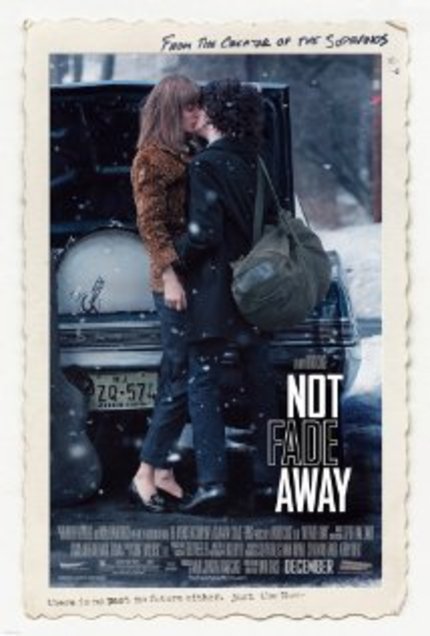Review: NOT FADE AWAY Fails to Start Me Up

For fans of the now-legendary HBO series The Sopranos, the Chase is on again. Chase as in David Chase, that program's uber-respected creator and detail-crazed driving force. Now, he's taken that amassed industry cred, and cashed it in to make the kind of high-end period rock 'n' roll coming of age tale that only guys like Cameron Crowe and Tom Hanks feel the need to create. For at least some of these guys, the story wallows in autobiographical flourish. Somewhere between nostalgia and narcissism lies the entrance to these foggy yet clear four-piece remembrances.
True to character, Chase has taken great pains to make sure that the time and place (1960s New Jersey) have been impeccably re-created; the characters are flawed and tortured just enough to be human. Like Crowe's Almost Famous (one of the best films of its year, and of its type), the real life story of the auteur behind the camera permeates everything. Unlike Crowe's film, however, Chase's story offers little in the way of an interesting hook. Like Hanks' That Thing You Do! (1996), Not Fade Away is the tale of a teenager in a so-so rock 'n' roll band back when rock 'n' roll was new.
The band has exactly one good song ("The Saint Valentine's Day Massacre"), and maybe half the drive and ambition that it might really take to make it. But, whereas The Wonders got a big break playing Cap'n Geech and the Shrimp Shack Shooters in a tepid beach party movie, this band goes nowhere, and not at all fast. Don't look for that familiar montage of rapid success, screaming fans on tour, and Billboard Magazine chart rising. These guys can barely leave the basement. When they should be practicing, they're too busy being cool, arguing with their squaresville parents (including Tony Soprano himself, James Gandolfini, as the Greatest Generation brick wall of a dad), or trying to get some girlie action. It's sex, drug, and arms length rock 'n' roll.
This is the dangerous side of rock that was forged in the zeitgeist forefront by the Satanic Majesties themselves, The Rolling Stones. Although heavy-hitters from The Beatles to Bob Dylan and many, many more have prominent tunes on the soundtrack (managed by E-Streeter and Sopranos veteran Steven Van Zandt), Chase makes certain the Stones' significance is felt throughout, opening the movie with an otherwise unrelated scene (in black and white) of young Mick Jagger meeting young Keith Richards for the first time on a train overseas. The next time we see these lads, they'll be older and on television (themselves, not actors playing them), terrorizing The Ed Sullivan Show and elsewhere with their blues-charged anti-showbiz fervor.
It's the early 1960s, and Western civilization is on the brink of a cultural revolution. Although the Rolling Stones amazing song "Tell Me" fuels the film, my hopes that Not Fade Away would be a gas, gas, gas were not met. Indeed, at times, it feels about 2,000 light-years from home (emotionally speaking). Make no mistake; this is the exact kind of movie that, going in, I truly hope I will love. (Much the way I love Almost Famous and, yes, That Thing You Do!.) But the self-obsessed snotty pseudo intellectual characters, including our lead (played by an astute John Magaro), who is more guilty than most in this department, make it just so hard to get in tune with. Though I try. And I try. And I try, and I try...
Not Fade Away has its moments, but the sheer visceral thrill of playing rock 'n' roll and the altogether need to create it is better communicated this year in a hand crafted no-budget care package like Brooklyn Brothers Beat the Best (a so-so comedy otherwise, which manages to serve up more musical vitality with two guys in their late twenties playing children's toys as instruments). The animalistic magnetism of early dirty rock is in the DNA of Not Fade Away, but fails to rise to the surface in a meaningful and felt way -- a necessary component for any autobiographical personal indulgence film.
It's quite likely that Chase, having never directed a feature film before, had grown so accustomed to slow brewing his stories on the aloof 'HBO setting' that he was unable to realize certain narrative needs and momentum of the larger yet more chronologically compact medium. What he does demonstrate time and time again is a complex understanding -- and mutual respect -- for all sides of the generation gap that defined his own coming of age, and is depicted here.
Chase, however, is unable to resist his artistically indulgent side in moments such as the very end of the film. A wide-eyed teeny bopper breaks the fourth wall with a ridiculous statement about nuclear bombs (heretofore not a topic) being in contention with rock 'n' roll for the soul of the country just before transitioning into a wide shot dance number that's meant to be cinematically transcendent. Based on the vibe of Not Fade Away, it would've made more sense to equate rock 'n' roll to a nuclear bomb before then dancing down the boulevard of broken dreams. Now that would've been dangerous. As it stands, the Chase is unfortunately off this time. Or, at least not quite on.
Not Fade Away is now playing in New York and Los Angeles. Check official site for more information.







